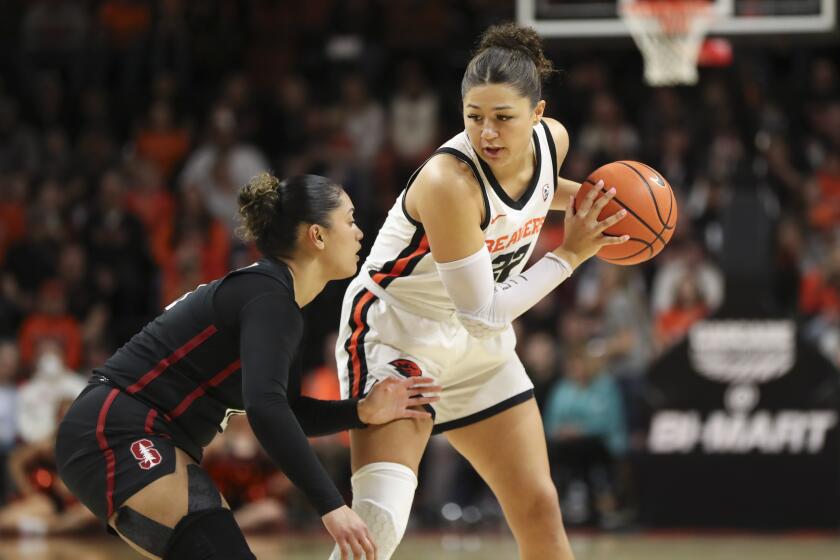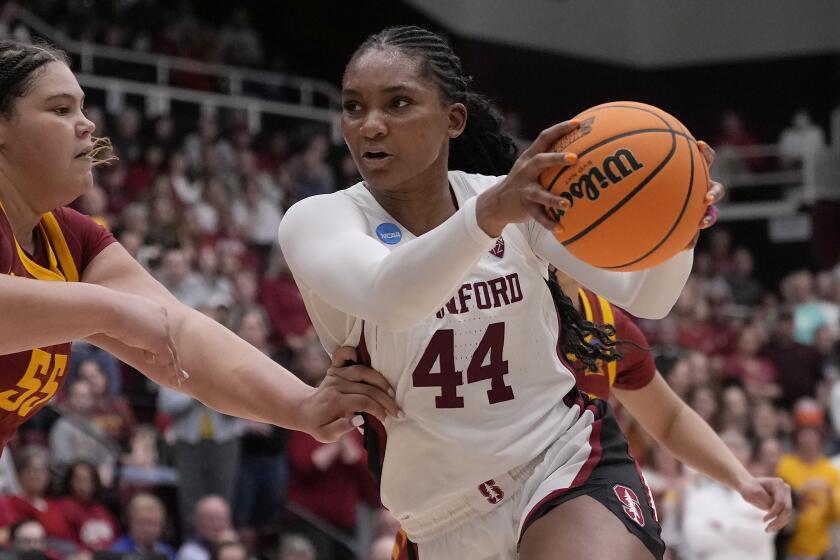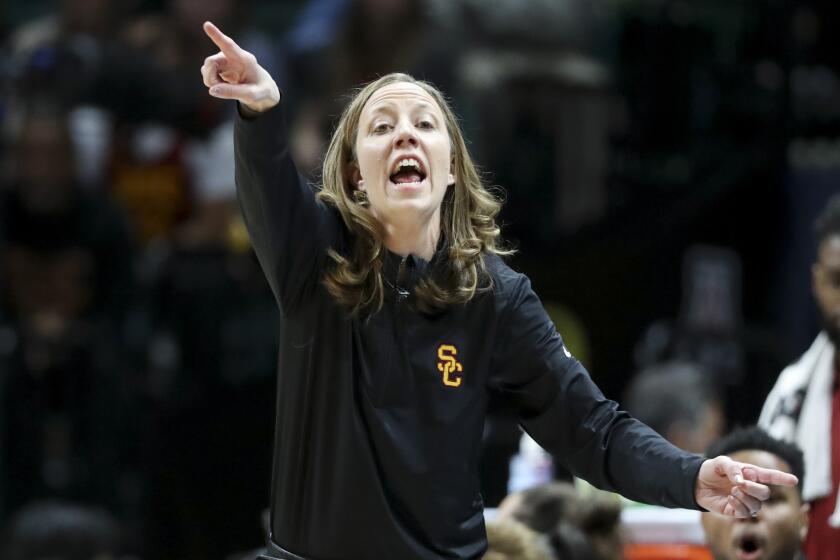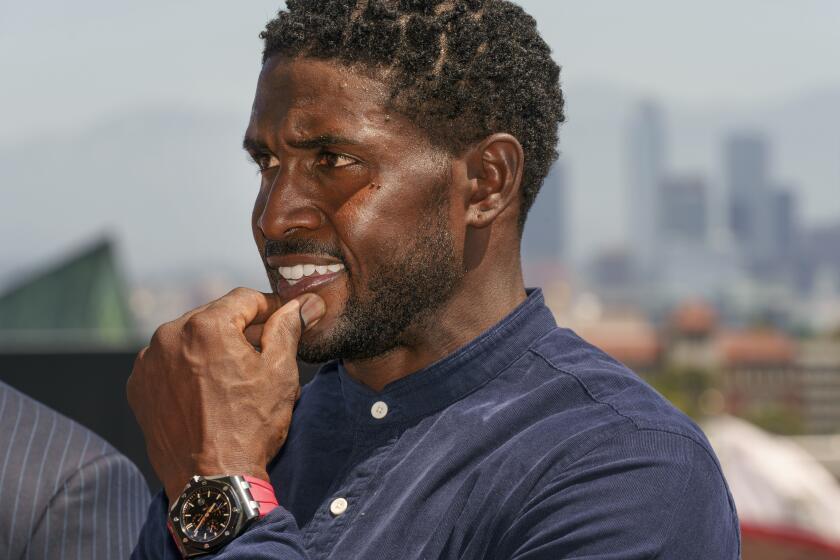O.J. Mayo scandal leads to heavy sanctions for USC basketball; team ‘shocked and saddened’
In a long-awaited response to allegations that former basketball star O.J. Mayo received improper cash and gifts while in school, USC will penalize its team by forfeiting victories and money, forgoing postseason play and curtailing recruiting.
“When we’ve done something wrong, we have an obligation to do something about it and that is exactly what we are doing here,” Athletic Director Mike Garrett said in a statement on Sunday.
The action comes as USC also faces allegations that two prominent football players -- current tailback Joe McKnight and former tailback Reggie Bush -- accepted improper benefits.
The NCAA, the ruling body of major-college sports, has combined its investigations of Bush and Mayo, looking for evidence that the athletic department failed to exert reasonable control over athletes.
By punishing itself before the NCAA acts, USC may be attempting to show its willingness to deal with misdeeds.
“It’s a statement of good faith if there is an acknowledgment that violations occurred,” said Tom Yeager, former chairman of the NCAA infractions committee. “Sometimes, it’s a way of taking your medicine and getting penalties out of the way.”
Mayo played only one season at USC -- leading the team with 20.7 points a game -- before jumping to the NBA in the spring of 2008.
The scandal broke shortly after his departure when Louis Johnson, a former confidant of the player, appeared on national television.
According to Johnson, a Los Angeles events promoter named Rodney Guillory received more than $200,000 from a Northern California sports management agency. Guillory then allegedly funneled at least part of that money to Mayo in the form of cash, clothes and a flat-screen television.
“I know Louis would say he was just telling the truth, that he had no ax to grind and didn’t want any ill will toward USC,” said Anthony V. Salerno, Johnson’s attorney. “But we all knew the chips would fall where they may.”
USC Coach Kevin O’Neill learned of the sanctions in a meeting with administrators after Saturday night’s game against Arizona State, the team’s eighth consecutive victory.
The coach said he relayed the news to a “shocked and saddened” team at a 10:15 meeting Sunday morning.
“Of course we’re shocked,” senior guard Dwight Lewis said. “We didn’t see this coming at all.”
The university worked closely with Pacific 10 Conference and NCAA officials to investigate the matter, Garrett said. He said the school is “disappointed that rules were violated” but did not elaborate on those violations.
The potential infractions include allegations that former coach Tim Floyd delivered cash to Guillory outside a stretch of Beverly Hills cafes in 2007.
Floyd, who abruptly resigned last spring, has denied he broke any rules. He could not be reached Sunday, but his attorney, Jim Darnell, said, “We don’t believe that Coach Floyd did anything improper with regard to O.J. Mayo. Whether somebody else did something outside of that, he didn’t know about it. But as far as Coach Floyd or anyone on his staff doing anything improper with O.J. Mayo, it didn’t happen.”
Mayo, who is in his second season with the Memphis Grizzlies, has also denied wrongdoing.
Other continuing investigations involve the football team.
The Heisman Trophy-winning Bush allegedly received cash and gifts from a pair of would-be sports marketers in 2004 and 2005. His parents also allegedly lived rent-free in a San Diego-area house owned by one of the businessmen.
That investigation has stretched for years with no action by the NCAA. But one of the erstwhile marketers has sued to recover alleged payments and, as part of a recent appellate court ruling, is now in position to question Bush, the player’s parents and USC Coach Pete Carroll in depositions.
Information from the civil lawsuit could later be used by NCAA officials.
More recently, McKnight was seen driving a Land Rover owned by a Santa Monica businessman, which might have constituted a violation of NCAA rules.
To some observers, the basketball program’s self-imposed punishment suggests that USC knew the NCAA was about to take action on one or more of the pending investigations.
“If [USC] is doing all that, they know something’s coming,” said the director of a compliance department at another major university who spoke on condition of anonymity. “They know they’re going to have their day in front of the Committee on Infractions, and they’re preparing.”
The strategy is common but doesn’t always work.
In recent years, the NCAA hit the football programs at Florida State and Oklahoma with additional punishment after those schools levied self-imposed sanctions.
The same could happen at USC despite Sunday’s announcement.
The Trojans’ postseason ban applies to this season only. The team will sacrifice one scholarship for this academic year and one for the next.
USC also will reduce by one the number of coaches permitted to recruit off-campus next summer and will shave 20 days off its total recruiting activities for the next academic year.
With Mayo playing spectacularly at times, the Trojans were 21-12 in 2007-08, losing to Kansas State in the first round of the NCAA tournament.
Not only will those wins be stricken from the record books, the school said it will return an undisclosed amount of money received from the NCAA tournament that season.
“We believe the self-imposed sanctions are consistent with penalties imposed at other NCAA institutions which have been cited with similar rules infractions,” Garrett said.
Pac-10 Commissioner Larry Scott said in a statement that USC’s decision to self-impose “aggressive penalties” was “clear recognition of how seriously the University takes this matter and the sincere commitment . . . to set the program on a track to maintain the highest standards expected of every institution in the Pac-10 and the NCAA.”
A month ago, the postseason ban might have seemed irrelevant for a team picked to finish near the bottom of the Pac-10. But the surprising Trojans, with a record of 10-4, were entertaining thoughts of the NCAA tournament in March.
“The best way for our players to look at it is we have practice tomorrow at 2 o’clock and we have a job to do and we’re going to do it,” O’Neill said.
twitter.com/LATimesWharton
Times staff writers Gary Klein and Lance Pugmire contributed to this report.
Go beyond the scoreboard
Get the latest on L.A.'s teams in the daily Sports Report newsletter.
You may occasionally receive promotional content from the Los Angeles Times.




